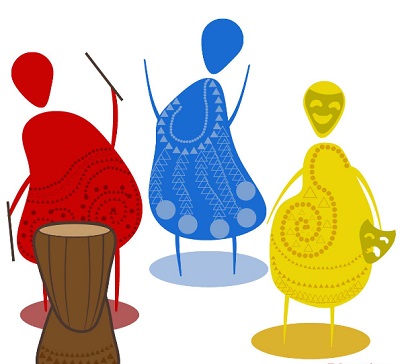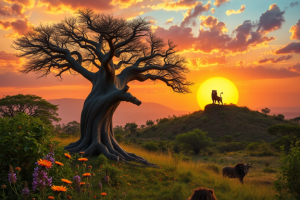
By 2024, African art, like arts anywhere in the world, is dynamic, very much alive and growing. However, that did not happen all over a sudden. It took many years of experimentation and the creation of favorable global and national opportunities for this unprecedented growth in the arts industry. What makes African arts different however is the fact that its development started late but is successfully catching up with the relatively more advanced continents and places. As we jot down these lines, African music and musicians have already claimed the top spots in global music industry.
This has changed in 2024. New names have appeared on the most famous African musicians, names that were so far unknown or little known. You have names like Tekno, Die Antwoord, P-Square and Sauti Sol. Did you know these names before 2024? I did not. The biggest name in African music has also changed. Instead of Davido and his contemporaries we have now A young man called Ahmed Ololade, otherwise known as Asake. Davido, the leading name in contemporary African music has gone down to the fourth rank. This is the nature of arts. You rise for a few years and go down the following year. this is the nature of stardom. New stars are born every now and then, eclipsing those who came before them.
Contemporary African literature has produced what we may call the giants of African letters. The post-colonial African literature was mostly protest literature tinged by anti-colonial protest movements and ideologies and calls for liberation that were strong and militant. Chinua Achebe’s classic “Things Fall Apart” became an instant sensation in the English-speaking world followed by such doyens of African letters as Wole Soyinka of Nigeria and Ngugi wa Tiongo of Kenya.
In 2024 many of the books that claimed the best selling list were not by the old school of African literature. New and highly talented female writers have started to knock at the doors of global literary stardom. When we look at the titles of the best African authors of 2024, we realize that there is a radical reality shift. Most of the names are new to readers and to the industry insiders. A new generation is coming up to claim its legitimate place. We have Onyi Niabineli with the novel entitled, “Allow Me to Introduce” (2024), Karen Jennings with “Crooked Seeds” (2024), Pemi Aguda with, “Ghostroots” (2024) and Ama Assantewa Diaka with “Someone Birthed them” (2024). One of the 20 most read African novels of 2024 is entitled “The Shadow King” and it is by Ethiopian female author Messeret Mengiste who lives in the United States.
African Music 2024
If there is anything 2024 announced to the arts and culture world, it is the fact that African music is experiencing its steep ascendancy. A few decades ago, Africans were mostly tuned to Western music and worshipped Western music celebrities. In the 1980s, Michael Jackson had a huge number of fans in Africa not because he was black but because his music was appealing to the black audience on the continent. Bob Marley’s revolution in black music had set the tone in the previous decades and these two celebrities had huge following not only within Africa but also across the entire world. for the sake of convenience I have taken the top musicians of two successive decades, namely the 1970s and 1980s.
The shift started after 2000 when African musicians, most of them talented, started to test the waters of international stardom. These were young singers and songs writers as well as composers who mostly lived in the West and mainly in the U.S., like Davido from Nigeria, and imbibed the styles, and tones and lyrics of black music from their elders and contemporaries. These young celebrities appeared ont the global stage quite unannounced. They blended with singers who were already established. They studied what the industry needed and what the global music audience would like to hear. They had two opportunities, namely wither to imitate the Western pop tradition in its raw form and become mimics or else break from that tradition and go back to their African roots.
The first option was already a beaten track. Many African musicians who had the talent to develop independently lost their talents by trying to be other than Africans, that is to say by trying to sing like their well-established Western counterparts. And that was the road of perdition. Those who chose to base themselves on African music traditions or styles and en absorb what is acceptable to the global audience, through a combination with the contemporary pop music well, these were the successful ones. Thus the marriage between African traditional music and contemporary pop was accomplished and this in turn gave them plenty of rooms for experimenting and inventing while at the same time they became successful in the marketplace.
By the beginning of the 2020s, African musicians were not only starting to dominate the global music industry. They were also becoming some of the well-known names in international entertainment business. The richest musicians in in the world are now not only black but also Africans. If we look at the data for 2024, we realize that Davido from Nigeria is leading the pack of richest African musicians with total revenue of 2.3 billion dollars followed by Wizkid worth 125 million dollars and Black Coffee with 16 million dollars. Fortunately popularity and wealth are two different things.
American rapper Jay Z is the wealthiest music artist in the world with Forbes magazine estimating his net worth at 2.5 billion dollars in 2024. According to the figures, Davido is the second richest musician in the world.
Unfortunately, the most popular musician in Africa is not the richest one. Burma Boy from South Africa is topping the list of most popular African musicians in 2024 while the crown of best artist went to South African singer Tyla who shined at the Grammy Awards this year. He won the title of Best African Music Performance Awards. T22 year-old outshone notable Nigerian contenders, including Davido, Asake, and Burma Boy.
According the latest information on the subject, in 2024, the African music scene continued to thrive with a diverse array of talented artists making waves not only on the continent but also on the global stage. The 10 top African nations that produce the best music are ranked as, Nigeria, Ghana, South Africa, Tanzania, Kenya, Congo Democratic, Benin, and Senegal.
African Literature 2024
Western media are serious when it comes to making money by selling the American Dream to the rest of the world. They have a number of prestigious literary and arts awards such as the Nobel, the Booker, the Commonwealth, Pulitzer, National Book Awards…etc. They have built solid institutions for movie awards such as the Cannes, Berlin, and other movie awards in various categories. True, there are African writes and moviemakers, or black actors or writers who are accorded one of these awards to celebrate their merits. Let’s look at this year’s Nobel Prize for literature. Personally, I was expecting Kenyan author James Ngugi, or Ngugi wa Tiongo in his native Gikuyu, to win the Nobel this year as he was shortlisted several times in the past. Ngugi, along with Soyinka is no doubt the great old doyens of African literature.
True, longevity has nothing to do with the Nobel award but Ngugi is an exceptional writer who has spent his entire working life writing books that matter for Africa and the world at large. Unfortunately an obscure author from Europe has dashed our hopes and Ngugi is left behind this year. Who knows next year may be his time for revenge.
African Cinema 2024
In 2024, African films and filmmakers have won some prestigious awards but the situation in this area has gone from bad to worse. The generation of Ousman Sembene’s film writers and producers is now almost forgotten. The new and emerging producers are struggling in the shadows of the big studios who choose what kind of movie to make as well as what kind of movie the audience should see. Otherwise, Ethiopian filmmakers Haile Gerima should at least be nominated or shortlisted for another prestigious award. He is still struggling to finish his new film that he started more than a decade ago and has rewritten for more than a dozen times.
When we look at the state of Ethiopian cinema, we feel nostalgic of the 1990s although the industry is still struggling with ‘pangs of childhood’, so to say. In a global industry dominated by the money churning studios in Hollywood, Ethiopian artists like Haile have little or no chance to catch the attention of movie moguls and the studios they control. The actors and producers of the 1990s are mostly out of business and there are no visible stars of the industry yet. There is no notable movie in 2024 and the prospects are not encouraging at all.
Ethiopia must be one of the countries in Africa where the arts in doldrums. 2024 can be considered the year of the big shifts in African arts and Artists. 2025 might also be a year of another big shift, a shift for the better. What we can do now is to enjoy the little art we have and expect the best next year. Sounds optimistic, doesn’t it?
BY MULUGETA GUDETA
THE ETHIOPIAN HERALD WEDNESDAY 1 JANUARY 2025




